Leptin-induced epithelial-mesenchymal transition in breast cancer cells requires β-catenin activation via Akt/GSK3- and MTA1/Wnt1 protein-dependent pathways
- PMID: 22270359
- PMCID: PMC3318705
- DOI: 10.1074/jbc.M111.322800
Leptin-induced epithelial-mesenchymal transition in breast cancer cells requires β-catenin activation via Akt/GSK3- and MTA1/Wnt1 protein-dependent pathways
Abstract
Perturbations in the adipocytokine profile, especially higher levels of leptin, are a major cause of breast tumor progression and metastasis; the underlying mechanisms, however, are not well understood. In particular, it remains elusive whether leptin is involved in epithelial-mesenchymal transition (EMT). Here, we provide molecular evidence that leptin induces breast cancer cells to undergo a transition from epithelial to spindle-like mesenchymal morphology. Investigating the downstream mediator(s) that may direct leptin-induced EMT, we found functional interactions between leptin, metastasis-associated protein 1 (MTA1), and Wnt1 signaling components. Leptin increases accumulation and nuclear translocation of β-catenin leading to increased promoter recruitment. Silencing of β-catenin or treatment with the small molecule inhibitor, ICG-001, inhibits leptin-induced EMT, invasion, and tumorsphere formation. Mechanistically, leptin stimulates phosphorylation of glycogen synthase kinase 3β (GSK3β) via Akt activation resulting in a substantial decrease in the formation of the GSK3β-LKB1-Axin complex that leads to increased accumulation of β-catenin. Leptin treatment also increases Wnt1 expression that contributes to GSK3β phosphorylation. Inhibition of Wnt1 abrogates leptin-stimulated GSK3β phosphorylation. We also discovered that leptin increases the expression of an important modifier of Wnt1 signaling, MTA1, which is integral to leptin-mediated regulation of the Wnt/β-catenin pathway as silencing of MTA1 inhibits leptin-induced Wnt1 expression, GSK3β phosphorylation, and β-catenin activation. Furthermore, analysis of leptin-treated breast tumors shows increased expression of Wnt1, pGSK3β, and vimentin along with higher nuclear accumulation of β-catenin and reduced E-cadherin expression providing in vivo evidence for a previously unrecognized cross-talk between leptin and MTA1/Wnt signaling in epithelial-mesenchymal transition of breast cancer cells.
Figures
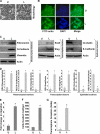
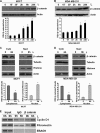

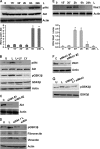
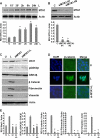
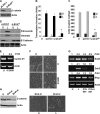
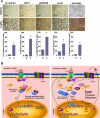
Similar articles
-
MTA1 promotes epithelial to mesenchymal transition and metastasis in non-small-cell lung cancer.Oncotarget. 2017 Jun 13;8(24):38825-38840. doi: 10.18632/oncotarget.16404. Oncotarget. 2017. PMID: 28418915 Free PMC article.
-
Honokiol abrogates leptin-induced tumor progression by inhibiting Wnt1-MTA1-β-catenin signaling axis in a microRNA-34a dependent manner.Oncotarget. 2015 Jun 30;6(18):16396-410. doi: 10.18632/oncotarget.3844. Oncotarget. 2015. PMID: 26036628 Free PMC article.
-
Metastasis-associated protein 1 short form stimulates Wnt1 pathway in mammary epithelial and cancer cells.Cancer Res. 2010 Aug 15;70(16):6598-608. doi: 10.1158/0008-5472.CAN-10-0907. Cancer Res. 2010. PMID: 20710043 Free PMC article.
-
Cross-talk of WNT and FGF signaling pathways at GSK3beta to regulate beta-catenin and SNAIL signaling cascades.Cancer Biol Ther. 2006 Sep;5(9):1059-64. doi: 10.4161/cbt.5.9.3151. Epub 2006 Sep 4. Cancer Biol Ther. 2006. PMID: 16940750 Review.
-
Biomarkers of epithelial-mesenchymal transition: E-cadherin and beta-catenin in malignant transformation of oral lesions.Can J Dent Hyg. 2024 Jun 1;58(2):111-119. eCollection 2024 Jun. Can J Dent Hyg. 2024. PMID: 38974823 Free PMC article. Review.
Cited by
-
Transmembrane-Bound IL-15-Promoted Epithelial-Mesenchymal Transition in Renal Cancer Cells Requires the Src-Dependent Akt/GSK-3β/β-Catenin Pathway.Neoplasia. 2015 May;17(5):410-20. doi: 10.1016/j.neo.2015.04.002. Neoplasia. 2015. PMID: 26025664 Free PMC article.
-
The activation of EP300 by F11R leads to EMT and acts as a prognostic factor in triple-negative breast cancers.J Pathol Clin Res. 2023 May;9(3):165-181. doi: 10.1002/cjp2.313. Epub 2023 Feb 13. J Pathol Clin Res. 2023. PMID: 36782375 Free PMC article.
-
ROCK inhibition activates MCF-7 cells.PLoS One. 2014 Feb 11;9(2):e88489. doi: 10.1371/journal.pone.0088489. eCollection 2014. PLoS One. 2014. PMID: 24523903 Free PMC article.
-
E-cadherin expression in obesity-associated, Kras-initiated pancreatic ductal adenocarcinoma in mice.Surgery. 2015 Dec;158(6):1564-72. doi: 10.1016/j.surg.2015.07.023. Epub 2015 Aug 18. Surgery. 2015. PMID: 26297056 Free PMC article.
-
Leptin influences estrogen metabolism and increases DNA adduct formation in breast cancer cells.Cancer Biol Med. 2016 Dec;13(4):505-513. doi: 10.20892/j.issn.2095-3941.2016.0079. Cancer Biol Med. 2016. PMID: 28154783 Free PMC article.
References
-
- Cirillo D., Rachiglio A. M., la Montagna R., Giordano A., Normanno N. (2008) Leptin signaling in breast cancer. An overview. J. Cell. Biochem. 105, 956–964 - PubMed
-
- Grossmann M. E., Ray A., Nkhata K. J., Malakhov D. A., Rogozina O. P., Dogan S., Cleary M. P. (2010) Obesity and breast cancer. Status of leptin and adiponectin in pathological processes. Cancer Metastasis Rev. 29, 641–653 - PubMed
-
- Ray A., Cleary M. P. (2010) Leptin as a potential therapeutic target for breast cancer prevention and treatment. Expert Opin. Ther. Targets 14, 443–451 - PubMed
-
- Artac M., Altundag K. (2011) Leptin and breast cancer: an overview. Med. Oncol., in press - PubMed
Publication types
MeSH terms
Substances
Grants and funding
LinkOut - more resources
Full Text Sources
Other Literature Sources
Medical
Research Materials
Miscellaneous

